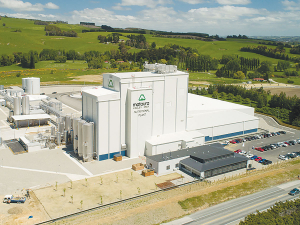Birth woes
OPINION: What does the birth rate in China have to do with stock trading? Just ask a2 Milk Company.
 For six months ending December 31, 2022, MVM reported a loss of $13.4 million on revenues of $45.7m.
For six months ending December 31, 2022, MVM reported a loss of $13.4 million on revenues of $45.7m.
The A2 Milk Company (a2MC) says returning its Southland-based Mataura Valley Milk (MVM) plant to profitability remains a key strategic focus.
For six months ending December 31, 2022, MVM reported a loss of $13.4 million on revenues of $45.7m.
MVM has been insourcing additional a2 Milk whole milk powder volumes from Synlait Milk, while continuing to produce products for third parties.
Releasing a2MC’s halfyear results last week, chief executive David Bortolussi, who also chairs the MVM board, says the loss reflected the current production mix with the plant primarily selling lower value milk powders on the commodity market.
“MVM is prioritising in-sourcing a2 Milk skim milk powder and certain other nutritional products from Synlait, developing future product innovation at the facility and exploring additional third-party customer opportunities,” says Bortolussi.
“To complement this and facilitate future China label GB registration applications, MVM is planning for the installation of a laboratory and blending and canning capability at the site and continues to review options to accelerate this strategy.”
The MVM plant, which started processing milk in August 2018, was built by the China Animal Husbandry Group: a2MC bought a 75% stake in the company in July 2021. a2MC also owns a 19.8% stake in Synlait and has a manufacturing and supply agreement for infant formula with the listed milk processor.
Bortolussi says a2MC’s half-year results are in line with the company’s expectations with double digit revenue and earnings growth.
Infant milk formula (IMF) sales grew 18% in a challenging market with China’s IMF market down 12.5%. Growth was driven by China label IMF sales with record market shares.
Revenue grew 18.6% to $783.3 million. China & ‘Other Asia’ sales were up 54%, ANZ sales down 24.6%, US sales up 61.8% and MVM sales up 18.4%.
Within IMF sales, China label sales were up 43.5% and English label sales up 1%. Liquid milk sales in ANZ and US were up 5.6% and 62% respectively.
“We are pleased with progress in implementing our refreshed growth strategy focused on the China market and improving our execution in the face of significant market headwinds and Covid related challenges,” says Bortolussi.
Despite challenges, he says a2MC is continuing to deliver against its refreshed growth strategy.
The company is expecting “low double digit” revenue growth this financial year supported by growth in China label IMF, Australia and New Zealand (ANZ) liquid milk and US liquid milk sales.
Bortolussi says MVM sales are expected to be down on last year’s reported sales due mainly to higher internal sales to a2MC from in-sourcing, and lower global dairy trade (GDT) commodity pricing.
He listed some key challenges as Covid-19’s impacts on supply and demand, achieving regulatory approvals in China, volume impact of price increases, cross border trade, foreign exchange movements, changes in interest rates and commodity prices, and changes in the regulatory environment.
“These challenges and risks could materially impact expected revenue and earnings outcomes,” Bortolussi says.
Controls on the movement of fruit and vegetables in the Auckland suburb of Mt Roskill have been lifted.
Fonterra farmer shareholders and unit holders are in line for another payment in April.
Farmers are being encouraged to take a closer look at the refrigerants running inside their on-farm systems, as international and domestic pressure continues to build on high global warming potential (GWP) 400-series refrigerants.
As expected, Fonterra has lifted its 2025-26 forecast farmgate milk price mid-point to $9.50/kgMS.
Bovonic says a return on investment study has found its automated mastitis detection technology, QuadSense, is delivering financial, labour, and animal-health benefits on New Zealand dairy farms worth an estimated $29,547 per season.
Pāmu has welcomed ten new apprentices into its 2026 intake, marking the second year of a scheme designed to equip the next generation of farmers with the skills, knowledge, and experience needed for a thriving career in agriculture.